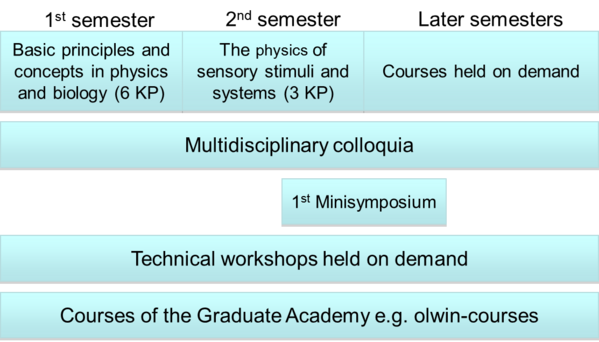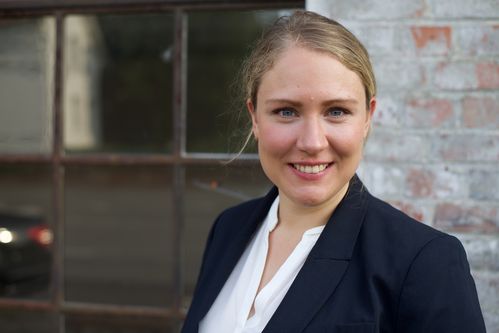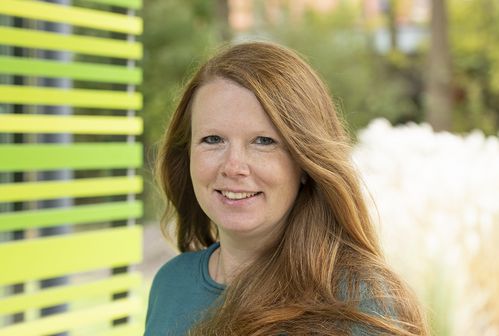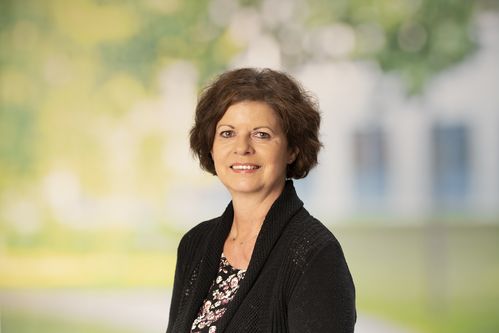Qualifikationsprogramm
Courses and Events of the Graduate School Oltech
Courses of the Graduate Academy
Qualifikationsprogramm

RTG Sensorybio Programme
The programme of all cohorts was launched with a kick-off opening symposium with invited external speakers and short presentations of the PhD thesis proposals.
Technical workshops and methodological multidisciplinarity
Among the key prerequisites for being successful in today’s scientific community are multidisciplinary competencies. Very often, the most revolutionary life science discoveries are made by scientists who understand multiple scientific disciplines, such as physics and biology, chemistry and biology or information technology, biology and biomedicine.
In addition, many new discoveries are made by scientists applying a technique that is well-known in one area of research on a subject where that technique has not previously been used. Therefore, one key aspect of the RTG study programme is to provide students with a wide range of physical and life sciences techniques. This RTG application offers the exciting possibility to join forces of scientists using innovative experimental techniques to monitor molecular interaction modes and switching processes by microscopy and spectroscopy in various mostly biological systems.
PhD programme “Neurosensory Science and Systems”
PhD programme “Neurosensory Science and Systems”
The study programme (and the scientific research projects) are integrated into the university-wide graduate school “OLTECH” of the University of Oldenburg and the PhD students are encouraged to enroll in the PhD programme “Neurosensory science and systems”.
This programme offers courses, which provide the PhD students with the fundamental advanced skills required as PhD students, including soft skills. The programme is already in place for all doctoral students that are supervised by scientists belonging to the research center “Neurosensory sciences” of the School of Natural Sciences and Mathematics (Faculty V) and the School of Medicine and Health Sciences (Faculty VI) at University of Oldenburg.
As part of the PhD programme, the doctoral students have to collect a total of 30 credit points (CP) consisting of (a) 12-18 CP subject specific courses that will enable the PhD student to expand their methodological skills and to gain project relevant scientific knowledge. (b) 6 CP targeted at increasing the communicative skills of the PhD students including an advanced presentation skills course and a mandatory poster presentation and/or talk at an international conference. (c) 6-12 CP courses aimed at preparing the PhD students for pursuing a successful career in academia and/or in science-related industry. Included are, for instance, a statistics course and an obligatory course on how to structure, write and present a scientific publication and a research proposal. Most applicants are members of the research center “Neurosensory sciences” and also take courses in the PhD programme “Neurosensory Science and Systems”.
Link to the courses of the Graduate School oltech
Example of a typical complete study programme
In this section, we present an example of a typical course programme, which a RTG graduate would be required to take during the three years of their PhD.
Extra course, which is special to the RTG
Module | Credit points (CP) |
Basic Principles and Concepts in Physics, Chemistry and Biology | 6 (obligatory) |
Courses taken as part of the PhD programme “Neurosensory sciences” (the obligatory courses [white background] take provide of 18 of the required 30 CP; the final 12 CP could for instance be those listed below with grey background.
Group I: Expansion of scientific / methodological knowledge
Module | Credit points (CP) |
Basics of sensory stimuli and systems | 3 (obligatory) |
Active participation in an international summer school or participation | 3 (optional)
|
Visit to a foreign lab to learn new techniques needed for the research | 3 or 6 (optional) |
Intensive methodological course in RTG working group or workshop | 3 (optional) |
Matlab course | 3 (optional) |
Group II: Communication and scientific presentation skills
Module | Credit points (CP) |
Advanced presentation skills including body language and networking | 3 (obligatory) |
Good Scientific practice | 0.5 (obligatory) |
Active participation in an international summer school or participation | 3 (obligatory) |
Group III: Skills important to scientists of any field
Module | Credit points (CP) |
How to publish own data in the form of a scientific paper | 6 (obligatory) |
Statistics course | 3 (optional) |
Numeric and computer skills | 3 (optional) |
Those listed with grey background are four, respectively two of many possible choices.
Timetable





